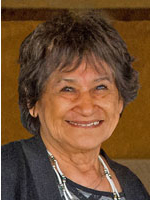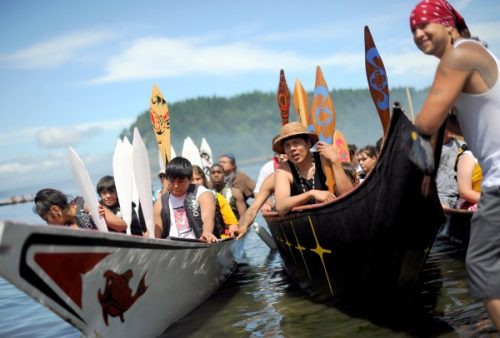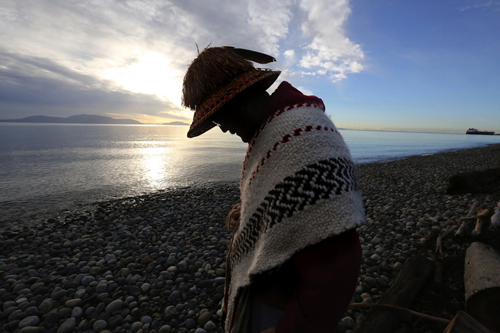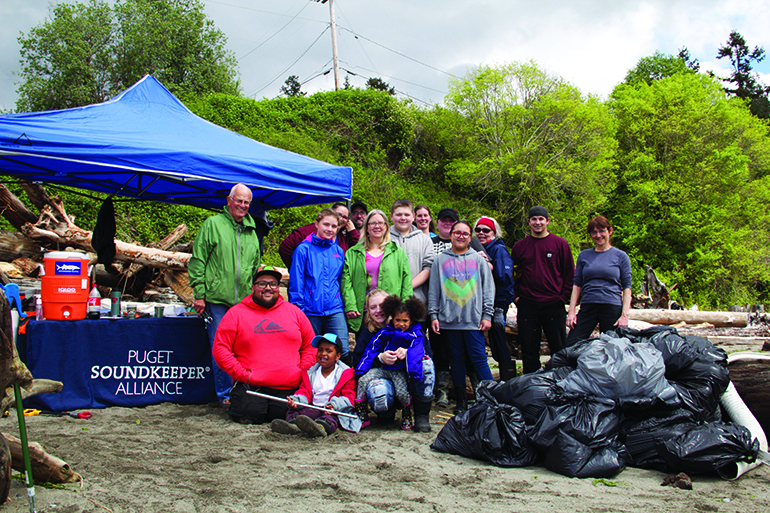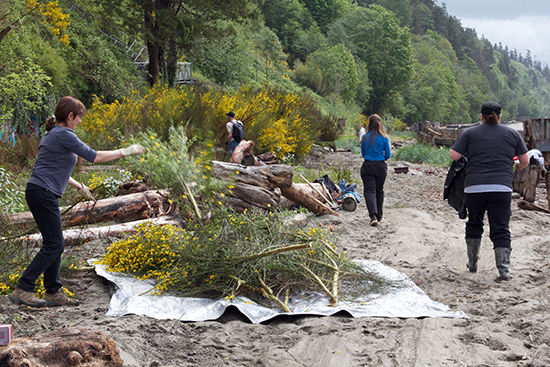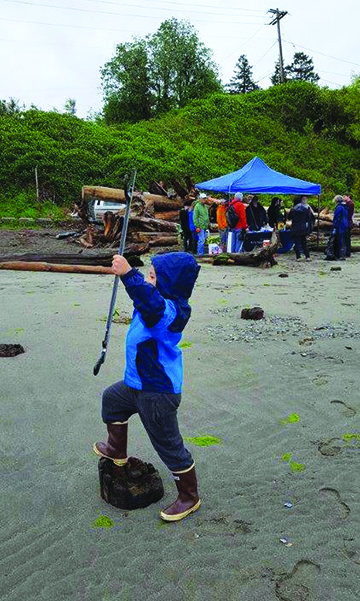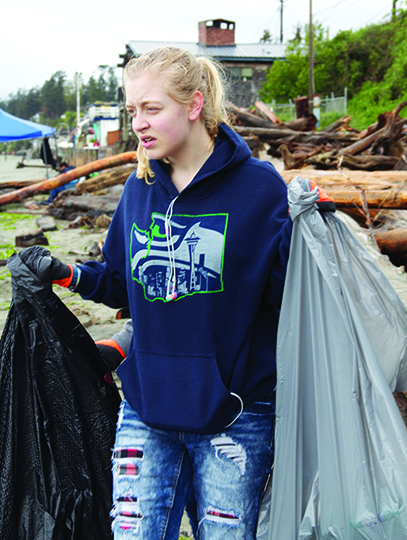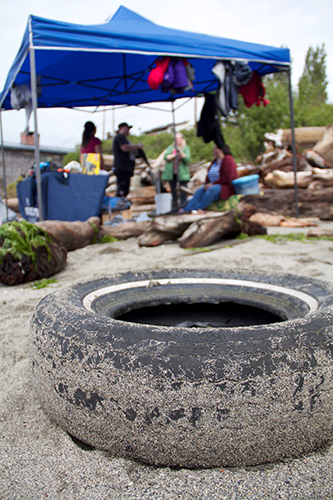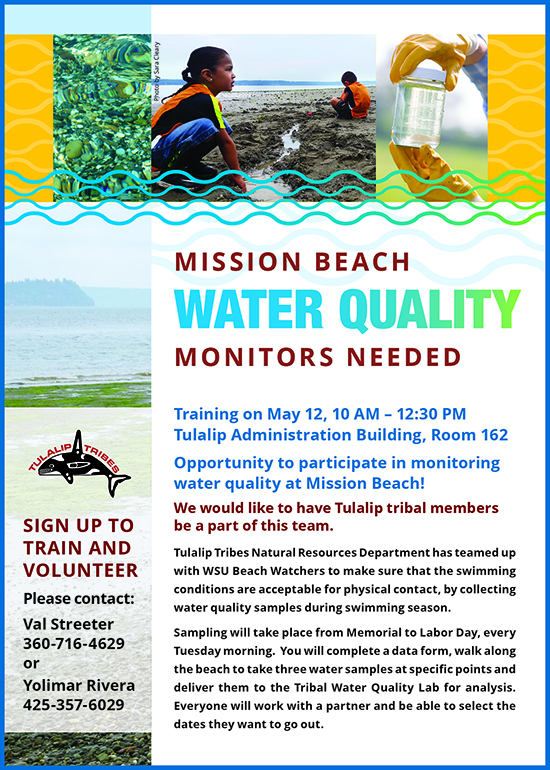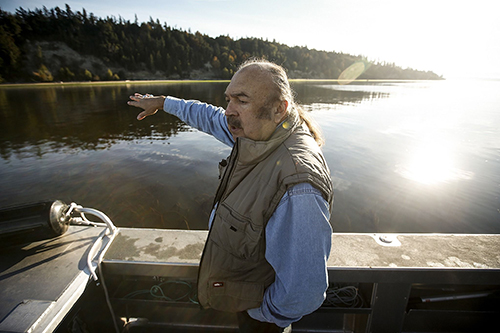
By Chris Winters, The Herald, Oct 22, 2016
TULALIP — From the deck of a 30-foot research boat owned by the Tulalip Tribes, Terry Williams pointed out the remnants of a bulkhead along Mission Beach where not long ago there was a string of beach houses.
In 2013, the leases on the tribal property weren’t renewed and the homes were removed. The main concern was erosion of the beach and the bluffs overhead damaging the fragile marine environment below.
Williams, who is the Tulalips’ treaty rights commissioner, said increased rainfall and stronger windstorms would saturate the sandy bluffs and cause them to slide down onto the houses below.
“It gets to the consistency of a milkshake and tends to fall,” Williams said.
On a bright fall day, several parts of the bluff showed clear evidence of slides. Houses were visible above.
Coastal landslides tend to silt up the nearshore environment, which is considered a critical piece of the salmon ecosystem.
“Those areas are really important for forage fish for threatened and endangered salmon,” said Joshua Meidav, the Tulalip Tribes’ conservation science program manager.
The beaches were created and rejuvenated over millennia by the gradual erosion of the bluffs. Development along the shore, including bulkheads, docks and clifftop homes, interrupted that natural process.
Now when the bluff slides, it tends to come down all at once, Williams said.
“The reality is that this is all changing,” he said.
An issue of rights
Climate change is a concern to Williams and the Tulalips in ways that go well beyond the usual worries about flooding and slides. It’s an issue of treaty rights.
While treaty rights are most commonly understood in the context of dividing the salmon harvest, their reach extends beyond the fishing grounds to tribal relationships with local, state and federal governments, said Ray Fryberg Sr., the Tulalips’ Executive Director of Natural Resources.
Most commonly that manifests in cooperative work with federal, state and local governments, and even private landowners, on many kinds of projects designed to restore salmon habitat.
On other occasions, the tribes have sought redress in the federal courts when they felt government wasn’t living up to its obligations.
“We’re like the last vanguard,” Fryberg said. “They have policies and procedures but there’s no enforcement.”
Most recently, that manifested in the “culverts case.”
In 2001, 21 tribes argued successfully that Washington state violated their treaty rights because culverts that carried streams under roads harmed salmon runs.
The 9th U.S. Circuit Court of Appeals upheld that decision in June, and ordered the state Department of Transportation to replace or fix 818 culverts at an estimated cost of $2.4 billion over the next 17 years.
It was a significant advancement of treaty rights into the realm of habitat restoration.
“The culvert case is the case that says there has to be a restoration so that ongoing harm doesn’t continue,” said Robert Anderson, a law professor and the director of the Native American Law Center at the University of Washington.
In this case, the state of Washington was found to have damaged habitat for salmon, and was ordered to make repairs.
Habitat protection and restoration were key elements in the second phase of a landmark decision by U.S. District Court Judge George Boldt.
In 1974, the first phase of the Boldt decision provided the basis for the co-management system, in which tribal and non-tribal fishermen divide the salmon harvest each year. The second phase, decided in 1984, focused on the habitat for the salmon.
“Phase II said that there’s not going to be a treaty resource of the salmon unless the environment is protected,” Fryberg said. “We get a certain amount of say-so in that.”
The part of the Phase II Boldt decision that obligated the federal government to restore habitat was overturned on appeal. However, the federal appeals court still said that the state of Washington and the tribes needed to take steps to protect and enhance the fisheries.
What those steps should be was left unstated.
“It’s difficult to argue that the federal government has an obligation to restore the ecosystem to, say, pre-treaty conditions, or treaty-time conditions,” Anderson said.
Some of the damage to habitat had already been done by that time, he said. Also, it’s a lot harder to assess the damage done by small changes, such as a single tide gate on private land, compared with the cumulative effects of the state’s culvert construction.
Momentum for restoration work can be created, however, when treaty rights are considered in tandem with the Endangered Species Act’s listing of various populations of salmon and steelhead.
“I think there’s a strong argument with the federal government to take steps to restore habitat,” Anderson said. “Maybe not a legal argument, but a treaty trust obligation to do it, and that they should do it.”
A seat at the table
In practical terms, that means that the tribes have been aggressive in forming partnerships to pursue environmental projects.
Representatives from the Tulalips and the Suquamish Tribes were included in last week’s announcement of a new governmental task force to identify goals to protect Puget Sound.
Tribes also have broad leeway to take on projects of their own that help restore habitat, or at least halt the progress of degradation.
It’s not a blanket authority to do anything anywhere, but it means tribes have a seat at the table whenever a treaty trust resource is affected.
As a coordinating body among the 20 treaty tribes of Western Washington, the Northwest Indian Fisheries Commission has a role supporting restoration programs to have a greater impact.
A lot of the commission’s work focuses on the marine nearshore environment, said Fran Wilshusen, the NWIFC’s habitat services director. That also means studying how the marine environment interacts with estuaries, river systems and the upland watersheds.
“We’re trying to pull the lens back and look at how the whole system is connected,” Wilshusen said.
That includes small projects, such as the Tulalips’ 2013 pilot study to release beavers in the western Cascades, where their activity of building dams is expected to help return the upper reaches of streams to their natural state, which happens to be better spawning territory for salmon.
Larger efforts include the Tulalips’ restoration of the 400-acre Qwuloolt Estuary in Marysville. A similar project was restoration of the 762-acre estuary in the Nisqually National Wildlife Refuge outside Tacoma by the Nisqually Tribe.
The ongoing Nearshore Restoration Project focuses on restoring beaches and marine environments damaged by beach erosion. It’s a Snohomish County project, and local tribes have a place at the table, serving on the boards of several organizations that provided money for the project, including the county’s Marine Resource Committee and the Northwest Straits Commission.
One project under way is an agreement between the Tulalip Tribes and the U.S. Forest Service to maintain a 1,280-acre tract in the Mount Baker-Snoqualmie National Forest as a source of wild huckleberries.
There aren’t that many places left in the mountains that are accessible by road that still provide habitat for the berries, which are important to tribal culture, said Libby Halpin Nelson, a senior environmental policy analyst with the Tulalips.
“They are healthy and they are a traditional food that is always looked for in ceremonies,” Nelson said.
The project includes removing small conifers that could “shade-out” the berries. In essence, the tribe is mimicking the effect forest fires used to have before fire suppression became standard response, she said.
Rights at risk
For all the work that’s been done to protect and restore salmon habitat, the fish runs continue to decline.
In spring, projections of low numbers of returning salmon, especially coho, led to a breakdown of negotiations between the tribes and the state. Tempers flared and fishermen protested when tribes were given permission to catch a small number of spring Chinook while the non-native sportsmen had to wait.
A July report from the Northwest Indian Fisheries Commission’s “Treaty Rights at Risk” initiative pointed out just how dire the situation was for many watersheds, including the Snohomish and Stillaguamish rivers: Habitat was being lost faster than it could be replaced and nearly every single indicator of the health of salmon populations was trending downward.
The challenges looming on the horizon are even more formidable.
A poster on Fryberg’s office wall has a picture of the late Nisqually leader Billy Frank Jr. and his warning to all Native American tribes: “As the salmon disappear, so do our tribal cultures and treaty rights. We are at a crossroads, and we are running out of time.”
With each new study, it becomes clearer that changes are elapsing at an increasing speed.
“Ten, 15 years ago, what we said would happen in 50 years is already happening,” Fryberg said.
The Tulalip Tribes hosted two summits this year, one in April concerning rising sea levels, and another in September that looked at adapting to climate change in general. Fryberg said the tribe is planning a third focused on the state of salmon recovery.
“Collectively, we have to be making some effort,” Fryberg said. “We have a responsibility to the future to try and do something.”
The quote from Billy Frank was from an essay he wrote in 2012, and it’s the next sentence that points to what needs to be done: “That’s why we are asking the federal government to come to align its agencies and programs, and lead a more coordinated recovery effort.”
Williams’ entire career has been focused on building bridges between tribal, state and federal governments.
Shortly after the Boldt decision, he was involved in setting up the co-management regime in the state, and then negotiating the Pacific Salmon Treaty with Canada and its First Nations, backed by research developed by Tulalip staff scientists.
In the 1990s he was tapped to open the Indian Office in the Environmental Protection Agency. But many efforts to restore salmon runs were coming up short.
“We were putting tremendous amount of money into restoration and we were losing ground,” Williams said.
He realized that many federal and state agencies operated in their own silos, and often they might set regulations that aren’t in line with each other or broader goals.
“It’s the authority of each individual agency, federal, state or local, that gives them the ability to create rules and standards,” Williams said. “Eleven agencies have independent programs and authorities in Puget Sound. Most are not geared toward Puget Sound recovery goals.”
At the climate change summit in September, Williams noted the decision by the U.S. Army Corps of Engineers and other federal agencies to temporarily halt work on the Dakota Access Pipeline after months of protests at the Standing Rock Sioux reservation. He said that was recognition that regulators were out of alignment with the Obama Administration’s agenda.
While a court has allowed some of that work to start up again, the government’s order came with an announcement that the federal government would consult with tribes on major infrastructure projects in the future.
The consultation process already existed since President Obama created a cabinet-level position to coordinate government-tribal relations, Anderson said.
“Here the Obama Administration seems to be signaling that, ‘Hey, maybe we ought to be doing more,’” he said.
That may lead simply to more federal agencies talking to each other and more often with tribal governments, which is still a step forward.
From the Tulalip research boat, Williams pointed out a section of Hermosa Point where he’s lived since the 1970s. Here too, the bluffs have slid, and some of the houses are perched on the edge, hanging over the lip.
“When I bought my house we were looking at getting closer to the bluff, but decided that wasn’t a good idea,” he said.
If stronger regulations are enacted, it would prevent some houses from being built, and that would translate into lower insurance costs for government. That would also help protect fragile ecosystems.
“The more we can understand it, the better we can prepare,” Williams said.
“What we’re seeing in climate impacts right now is just the beginning.”
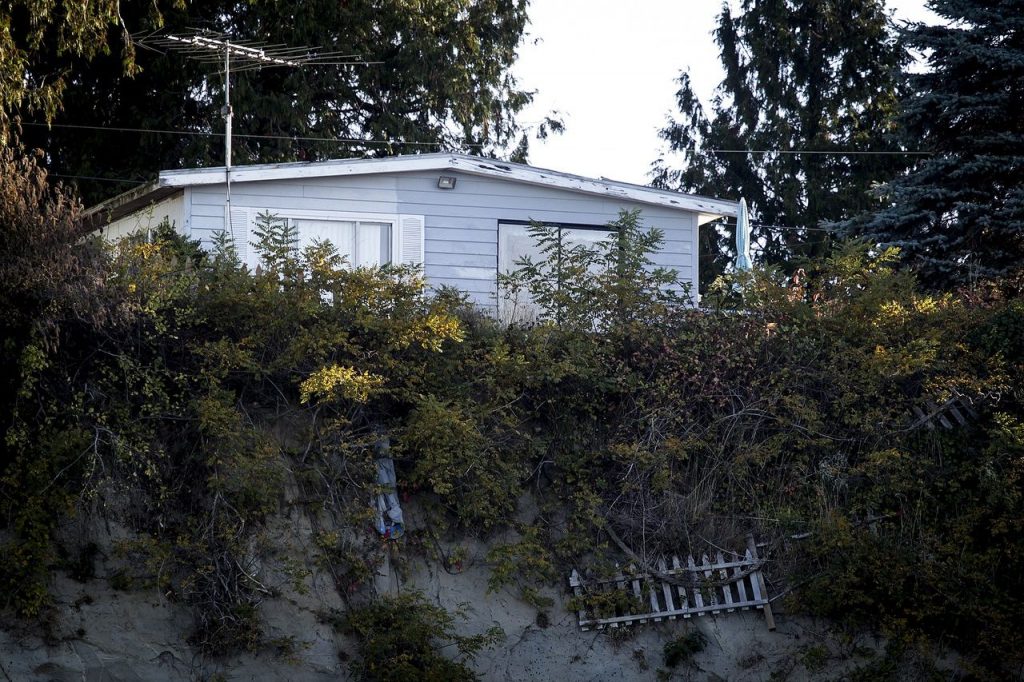
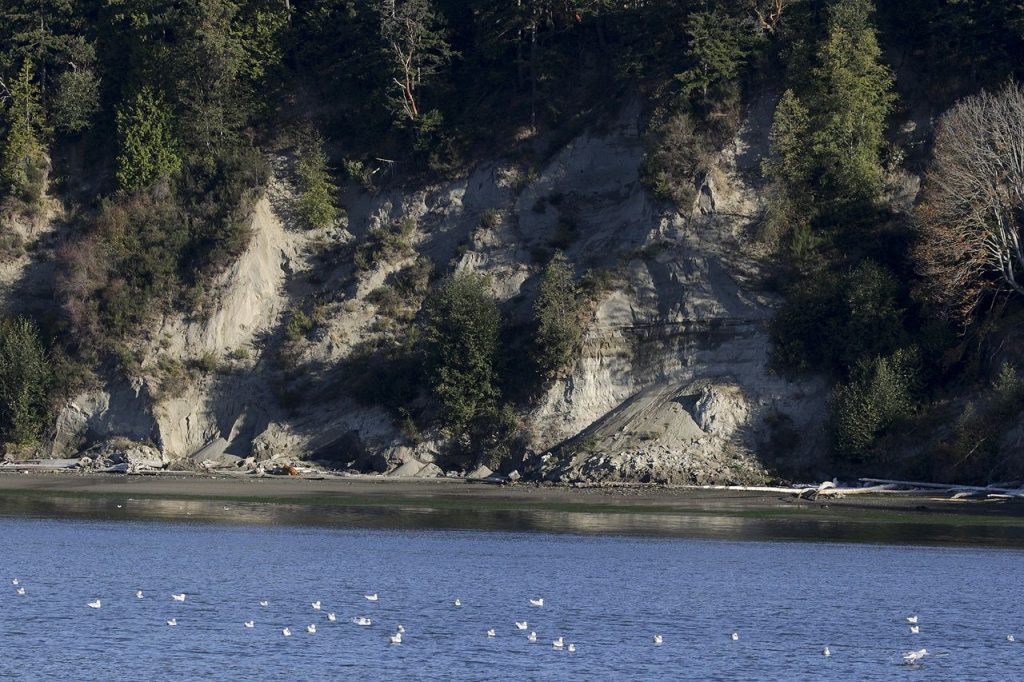
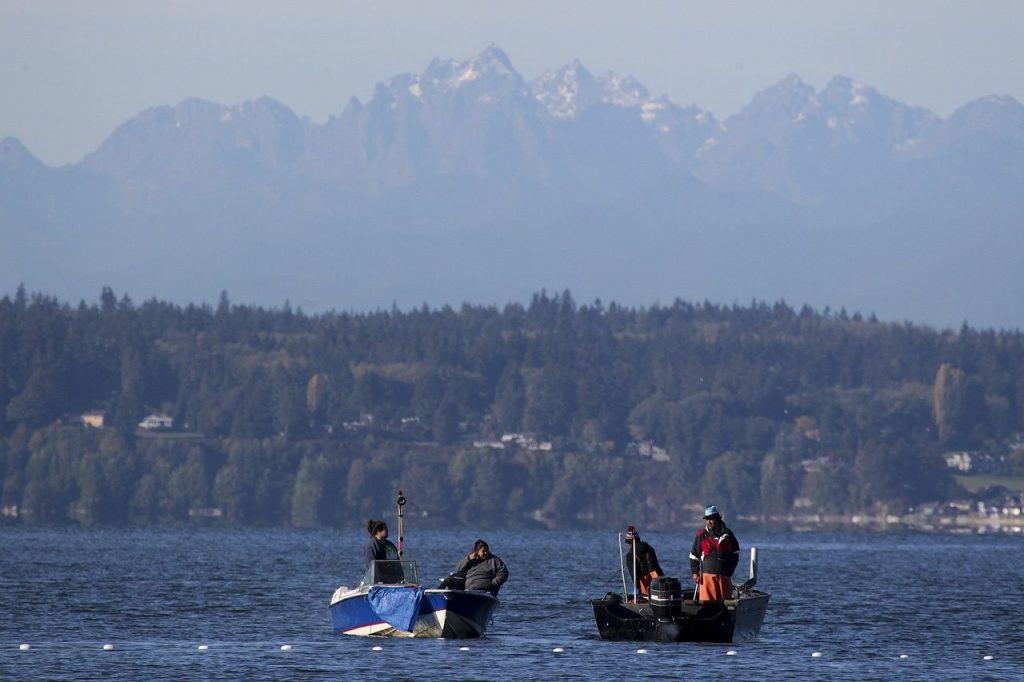
Chris Winters: 425-374-4165; cwinters@heraldnet.com. Twitter: @Chris_At_Herald.


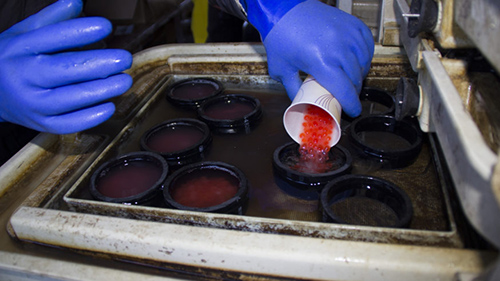

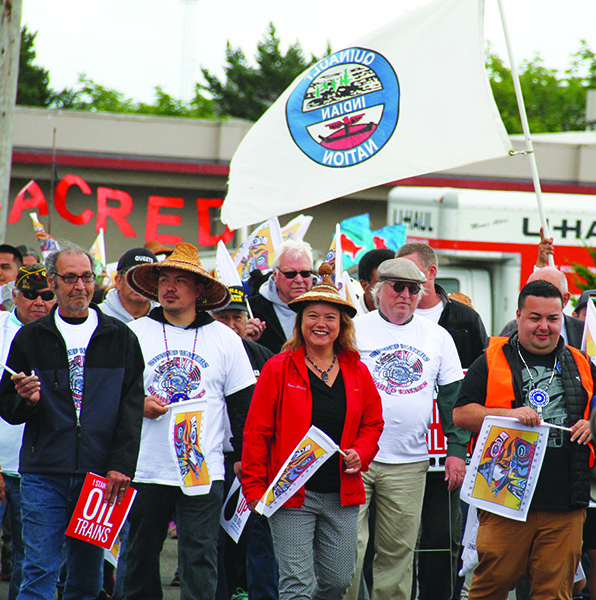
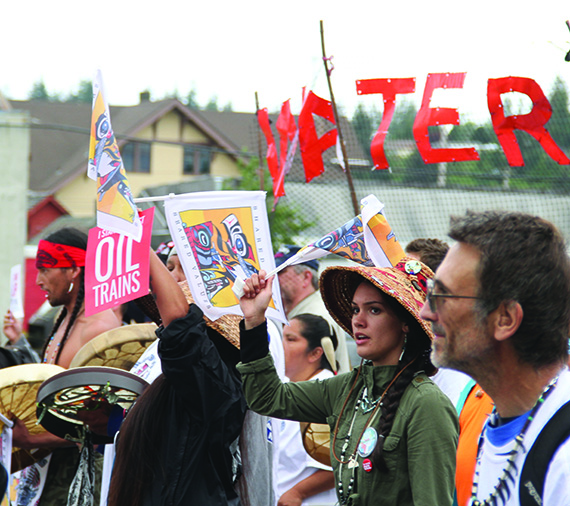
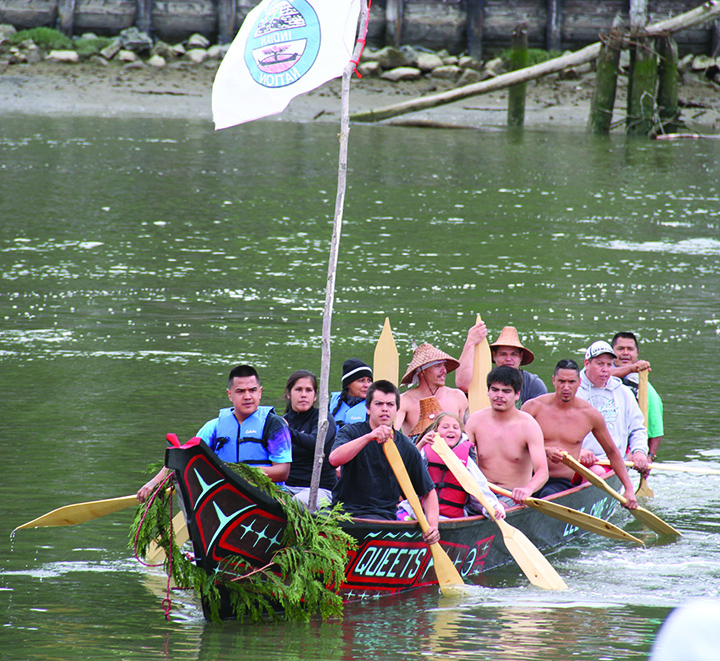
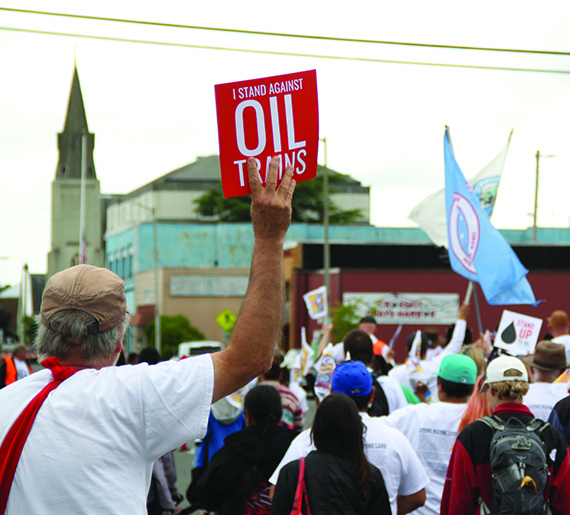
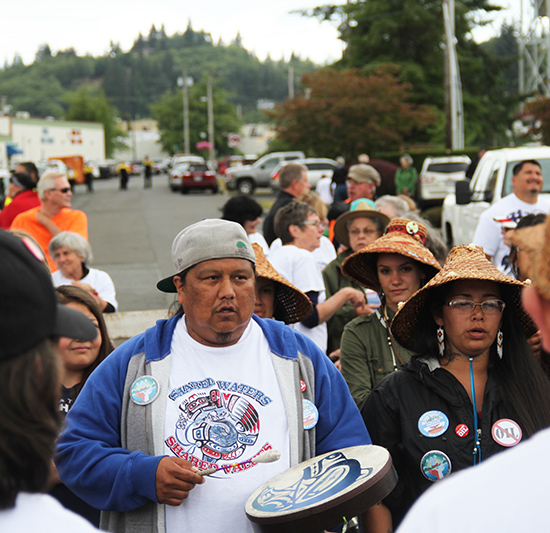


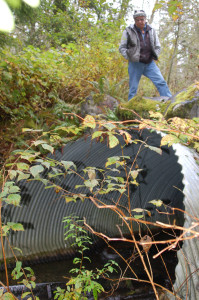

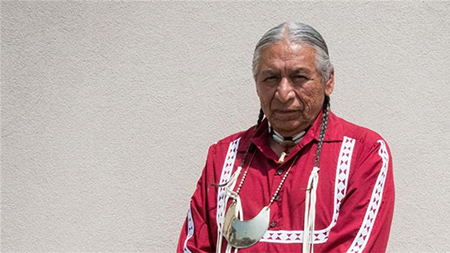
![Volunteers gather their wild gardening tools to cut back and clear out other plant species that are currently out-competing with the fragile river cane for resources [Nicholas Linn/Al Jazeera]](http://www.tulalipnews.com/wp/wp-content/uploads/2016/06/1002e41acd8f4541bd7e3e6b3dc7f495_18.jpg)
![Volunteers join Cain for a day of 'wild gardening' in the Sequoya National Wildlife Refuge in northeast Oklahoma [Nicholas Linn/Al Jazeera]](http://www.tulalipnews.com/wp/wp-content/uploads/2016/06/0e296309b18c444daf0d7d635451c2f5_18.jpg)
![Roger Cain is one of a handful of academics studying river cane. A Cherokee, Cain is working on a project to map what remains of the river cane on Cherokee land [Nicholas Linn/Al Jazeera]](http://www.tulalipnews.com/wp/wp-content/uploads/2016/06/dc04b5146b034804bf1ed91a77d56393_18.jpg)

